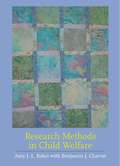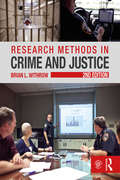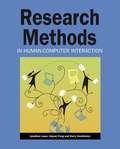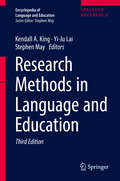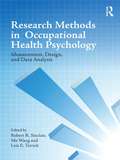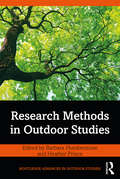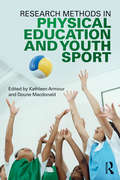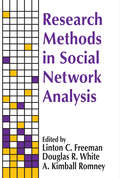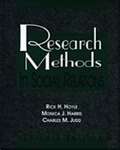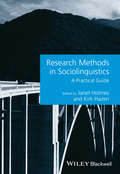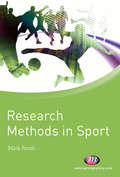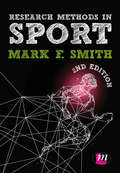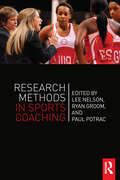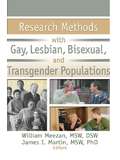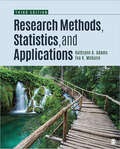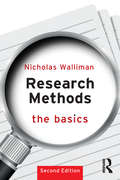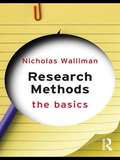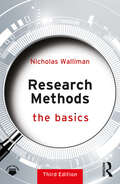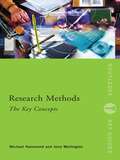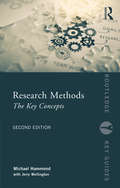- Table View
- List View
Research Methods in Child Welfare
by Amy J. Baker Benjamin CharvatSocial service agencies are facing the same expectations in quality management and outcomes as private companies, compelling staff members and researchers to provide and interpret valid and useful research to stakeholders at all levels in the field. Child welfare agencies are particularly scrutinized. In this textbook, two highly experienced researchers offer the best techniques for conducting sound research in the field. Covering not only the methodological challenges but also the real-life constraints of research in child welfare settings, Amy J. L. Baker and Benjamin J. Charvat present a volume that can be used both for general research methods and as a practical guide for conducting research in the field of child welfare. Baker and Charvat devote an entire chapter to ethical issues involved in researching children and their families and the limits of confidentiality within this population. They weave a discussion of ethics throughout the book, and each chapter begins with a scenario that presents a question or problem to work through, enabling readers to fully grasp the methods in the context of a specific setting or area of concern. Special sections concentrate on the value of continuous quality-improvement activities, which enable the collection and analysis of data outside of the strictures of publishable research, and the implementation of program evaluations, which can be helpful in obtaining further research and programmatic funding.
Research Methods in Conflict Settings
by Dyan Mazurana Karen Jacobsen Lacey Andrews Gale Dyan Mazurana Karen JacobsenIncreasing numbers of researchers are now working in regions experiencing high levels of conflict or crisis, or among populations that have fled violent conflict to become refugees or internally displaced persons. Understanding these conflicts and their aftermath should be shaped not only by the victors and their elite companions but also by the local people whose daily lives become intertwined with the conflict - and it is this "view from below" that this volume's authors seek to share. Yet conducting rigorous research in these kinds of field contexts presents a range of ethical, methodological, logistical, and security challenges not usually confronted in non-conflict field contexts. This volume compiles a rich variety of lessons learned by experienced field researchers, many of whom have faced demanding situations characterized by violence, profound and well-grounded distrust, and social fragmentation. The authors' offer options, ideas, and techniques for studying the situations of people affected by conflict and, by focusing on ethical and security issues, seek ways to safeguard the interests and integrity of the research "subjects" and of the researchers and their teams.
Research Methods in Crime and Justice (Criminology and Justice Studies)
by Brian L. Withrow<p>Research Methods in Crime and Justice, 2nd Edition, is an innovative text/online hybrid for undergraduate Criminal Justice Research Methods courses. This material uniquely addresses the fundamental teaching issue for this course: how to show students that success as criminal justice practitioners is linked to their acquisition of research skills. Brian Withrow, a widely published academic researcher and former Texas State Trooper, developed this approach for his own undergraduate Research Methods class. He persuasively demonstrates that research skills aren’t just essential to university academic researchers but to successful criminal justice practitioners as well. <p>More than 80 short, sharply focused examples throughout the text rely on research that is conducted by, on behalf of, or relevant to criminal justice practitioners to engage students’ interest like no other text of its kind. Extensive web materials all written by the author provide an array of instructor support material, including a Researcher’s Notebook that provides students (and their instructors) with a series of structured exercises leading to the development of a valid research project. Withrow systematically walks students through defining a question, conducting a literature review, and designing a research method that provides the data necessary to answer the research question—all online, with minimal instructor supervision. <p>The second edition features expanded coverage of measurement, qualitative research methods, and evaluation research methods, as well as additional downloadable journal articles to ensure students begin to think critically about research and can read scholarly literature.</p>
Research Methods in Human-computer Interaction
by Jonathan Lazar Harry Hochheiser Jinjuan Heidi FengA comprehensive research guide for both quantitative and qualitative research methods Written by a team of authorities in human-computer interaction (HCI) and usability, this pedagogical guide walks you through the methods used in HCI and examines what are considered to be appropriate research practices in the field. Featuring a plethora of real-world examples throughout, you'll discover how these methods have been used in HCI research so that you can gain a stronger understanding of the subject matter. Serves as an authoritative, comprehensive resource on all things related to research methods in human-computer interaction Addresses experimental research and design methods, statistical analysis, and time diaries Shares authentic case studies, interviews, and focus group experiences Reviews analyzing qualitative data, working with human subjects, handling automated computer data collection methods, and more If you are looking for a detailed, no-nonsense resource that offers in-depth coverage of HCI methods, then this is the book for you.
Research Methods in Language and Education
by Stephen May Kendall A. King Yi-Ju LaiIn this third, fully revised edition, the 10 volume Encyclopedia of Language and Education offers the newest developments, including an entirely new volume of research and scholarly content, essential to the field of language teaching and learning in the age of globalization. In the selection of topics and contributors, the Encyclopedia reflects the depth of disciplinary knowledge, breadth of interdisciplinary perspective, and diversity of socio-geographic experience in the language and education field. Throughout, there is an inclusion of contributions from non-English speaking and non-western parts of the world, providing truly global coverage. Furthermore, the authors have sought to integrate these voices fully into the whole, rather than as special cases or international perspectives in separate sections. The Encyclopedia is a necessary reference set for every university and college library in the world that serves a faculty or school of education, as well as being highly relevant to the fields of applied and socio-linguistics. The publication of this work charts the further deepening and broadening of the field of language and education since the publication of the first edition of the Encyclopedia in 1997 and the second edition in 2008.
Research Methods in Occupational Health Psychology: Measurement, Design and Data Analysis
by Robert R. Sinclair Mo Wang Lois E. TetrickResearch Methods in Occupational Health Psychology: Measurement, Design, and Data Analysis provides a state-of-the-art review of current issues and best practices in the science of Occupational Health Psychology. Occupational Health Psychology (OHP) is a multidisciplinary and rapidly growing area of research and it is difficult or impossible for researchers to keep up with developments in all of the fields where scholars conduct OHP science. This book will help OHP scholars improve their own research by translating recent innovations in methodology into sets of concrete recommendations that will help scholars improve their own research as well as their training of future researchers.
Research Methods in Outdoor Studies (Routledge Advances in Outdoor Studies)
by Barbara Humberstone Heather PrinceOver the last two decades Outdoor Studies has emerged as an innovative and vibrant field of study. This is the first book to offer a comprehensive appraisal of established and cutting-edge research methods as applied to Outdoor Studies. Covering qualitative, quantitative and mixed methods, the book examines key methodologies, themes and technologies such as digital research, mobile methodologies, ethnography, interviews, research design, research ethics and ways of disseminating research. Featuring contributions from leading researchers from a variety of disciplinary backgrounds, this is an essential text for any Outdoor Studies course or for researchers looking for innovative and creative research techniques.
Research Methods in Physical Education and Youth Sport
by Kathleen Armour Doune MacdonaldThis is the first research methods book to focus entirely on physical education and youth sport. It guides the reader through the whole research process; from the first steps to completion of a dissertation or practice-based project, and introduces key topics such as: formulating a research question qualitative approaches quantitative approaches mixed method research literature review case studies survey, interviews and focus groups data analysis writing the dissertation. Each chapter includes a full range of useful pedagogical features, including chapter summaries, practical activities, case studies, dialogues with active researchers and guidance on further reading and resources. With contributions from some of the world’s best-known researchers in the field, this book is indispensible reading for all students and professionals working in physical education, youth sport, sports coaching and related subjects.
Research Methods in Social Network Analysis
by A. Kimball Romney Linton C. Freeman Douglas R. WhiteSince the publication of Herbert Spencer's Principles of Sociology in 1875, the use of social structure as a defining concept has produced a large body of creative speculations, insights, and intuitions about social life. However, writers in this tradition do not always provide the sorts of formal definitons and propositions that are the building blocks of modern social research. In its broad-ranging examination of the kind of data that form the basis for the systematic study of social structure, Research Methods in Social Network Analysis marks a significant methodological advance in network studies.As used in this volume, social structure refers to a bundle of intuitive natural language ideas and concepts about patterning in social relationships among people. In contrast, social networks is used to refer to a collection of precise analytic and methodological concepts and procedures that facilitate the collection of data and the systematic study of such patterning. Accordingly, the book's five sections are arranged to address analytical problems in a series of logically ordered stages or processes.The major contributors define the fundamental modes by which social structural phenomena are to be represented; how boundaries to a social structure are set; how the relations of a network are measured in terms of structure and content; the ways in which the relational structure of a network affects system actors; and how actors within a social network are clustered into cliques or groups. The chapters in the last section build on solutions to problems proposed in the previous sections. This highly unified approach to research design combined with a representative diversity of viewpoints makes Research Methods in Social Network Analysis a state-of-the-art volume.
Research Methods in Social Relations (7th edition)
by Rick H. Hoyle Monica J. Harris Charles M. JuddA problem-focused perspective to social science methods.
Research Methods in Sociolinguistics: A Practical Guide (Guides to Research Methods in Language and Linguistics)
by Janet Holmes Kirk HazenThis single-volume guide equips students of sociolinguistics with a full set of methodological tools including data collection and analysis techniques, explained in clear and accessible terms by leading experts. It features project suggestions, troubleshooting tips, and data assessment across diverse languages. Explores an array of anthropological and scientific methods that cover the full spectrum of contemporary sociolinguistics, from the study of style and discourse analysis to the study of phonetics Details the types of data available, and explains collection methods ranging from sociolinguistic interviews to linguistic landscapes Provides comprehensive coverage of data analysis, subdivided into segments on linguistic and socio-cultural techniques, and linked to numerous languages Includes useful summaries, seasoned advice and troubleshooting tips, ideas for research projects, and a full directory of supplementary reading
Research Methods in Sport
by Mark F SmithThis book is a comprehensive resource for all those studying sport at college or university. It covers qualitative and quantitative methods, and explains what research is, how to conduct a systematic review, and how to select, apply and combine research methods.The reader is supported throughout by learning activities, real-life examples and advice on further study.
Research Methods in Sport (Active Learning in Sport Series)
by Mark SmithPacked full of essential tools and tips, this second edition is your quick-start guide to undertaking research within real world of sport. Using clear, accessible language, Smith maps an easy-to-follow journey through the research process, drawing upon the most up-to-date evidence and resources to help you select the most appropriate research approach for your project. Throughout the book you will discover: Key points that highlight important definitions and theories; Reflection points to help you make connections between key concepts and your research; Learning activities to put your newfound knowledge into practice; Further reading to explore the wider context of sport research in the real world. Featuring over thirty-five case studies of students’ and academics’ research in practice, this book is the perfect guide-by-your-side to have during your own sport research.
Research Methods in Sports Coaching
by Lee Nelson Paul Potrac Ryan GroomResearch Methods in Sports Coaching is a key resource for any student, researcher or practitioner wishing to undertake research into sports coaching. It takes the reader through each phase of the research process, from identifying valuable research questions, to data collection and analyses, to the presentation and dissemination of research findings. It is the only book to focus on the particular challenges and techniques of sports coaching research, with each chapter including examples, cases and scenarios from the real world of sports coaching. The book introduces and explores important philosophical, theoretical and practical considerations in conducting coaching research, including contextual discussions about why it’s important to do sports coaching research, how to judge the quality of coaching research, and how sports coaching research might meet the needs of coaching practitioners. Written by a team of leading international scholars and researchers from the UK, US, Canada and Australia, and bridging the gap between theory and practice, this book is an essential course text for any research methods course taken as part of a degree programme in sports coaching or coach education.
Research Methods in Sports Coaching
by Lee Nelson Paul Potrac Ryan GroomResearch Methods in Sports Coaching is a key resource for students and scholars who are completing research into sports coaching. The book comprises five distinct parts that prompt readers to think about important considerations: preparing and initiating the coaching research process philosophical considerations for coaching research coaching research designs methods of collecting coaching data analysing coaching data This fully revised edition places particular emphasis on introducing the diverse research paradigms, research designs, as well as methods of data collection and analysis available to coaching researchers.Written by a team of leading international scholars and researchers from the UK, Sweden, the United States, Canada, New Zealand, and Australia, this book bridges the gap between the theory and practice of sports coaching research. The second edition of Research Methods in Sports Coaching is an essential text for any research methods course taken as part of a degree programme in sports coaching or coach education.
Research Methods with Gay, Lesbian, Bisexual, and Transgender Populations
by William Meezan James I. MartinTake an in-depth look at what works-and what doesn't-in research with GLBT populations! This essential book examines the usefulness of current frameworks for research with GLBT populations and highlights the necessity for greater complexity in the conceptualization and design of research with these populations. It will help you understand the need for more inclusive and representative samples and the need to protect the privacy of GLBT research participants-and ways to accomplish these goals. In addition, Research Methods with Gay, Lesbian, Bisexual, and Transgender Populations considers the advantages and limitations of having an "inside" perspective when conducting research with these populations. It also explores the myriad ways in which this research can be used to better understand issues facing GLBT communities. Specifically, Research Methods with Gay, Lesbian, Bisexual, and Transgender Populations discusses: eight strategies that "outsiders" can use to overcome barriers to doing their work the challenges of finding and studying older members of gay and lesbian communities the special challenges that studying gay drug users pose to the researcher factors affecting research with urban Black and African-American GLBT populations sampling issues, including ways to overcome the challenges of conducting research with sexual minority adolescents, issues related to dealing with institutional review boards, and lessons derived from empirical articles in the Journal of Gay & Lesbian Social Services unique features of AIDS service organizations to consider when developing an evaluation strategy ethical standards for research and evaluation with GLBT populations and a great deal more! From the Foreword, by Anthony R. D'Augelli: "In social science research, the effort to extract durable principles of social causality from the apparent randomness of everyday life requires the construction of reliable, if tentative, knowledge that is significantly more informative than mere speculation. With our ever-increasing knowledge base, increasingly sophisticated and powerful quantitative and qualitative methodologies, and with an ever-expanding cadre of researchers, our ability to discern patterns of development of GLBT people from birth to death, the unique qualities of their relationships, and the impact of communities and cultures on the ways in which their sexualities are manifested, will come into sharper focus. In this way, research becomes a tool by which GLBT people transcend invisibility and marginalization. As new research accumulates, the unique contributions that GLBT lives make to our understanding of the nature of human development will be documented in ways never before thought possible. "Within the larger context of social science research on GLBT populations, this book describes the current status of social service researchers in their quest for methodological sophistication and conceptual complexity. The work of the contributors to this volume exemplifies the progress that has been made since the first research reports on this topic were published."
Research Methods, Statistics, and Applications
by Kathrynn A. Adams Eva Kung McGuire (aka: Lawrence)Research Methods, Statistics, and Applications by Kathrynn A. Adams and Eva K. McGuire is designed to give students the experience of being a researcher by combining the interrelated concepts of research methods and statistics to better explain how the research process incorporates both elements. Employing a conversational tone throughout, coupled with an emphasis on decision-making, this best-selling text will spark students’ interest in conducting research and improve their ability to critically analyze research in their daily lives. The Third Edition includes a new chapter on measurement to better highlight its critical importance, updates for the 7th edition of the Publication Manual of the American Psychological Association, new examples related to social justice, additional sections on qualitative research methods, and more thorough integration of research ethics information and tips throughout each chapter.
Research Methods, Statistics, and Applications
by Kathrynn A. Adams Eva Kung McGuire (aka: Lawrence)Research Methods, Statistics, and Applications by Kathrynn A. Adams and Eva K. McGuire is designed to give students the experience of being a researcher by combining the interrelated concepts of research methods and statistics to better explain how the research process incorporates both elements. Employing a conversational tone throughout, coupled with an emphasis on decision-making, this best-selling text will spark students’ interest in conducting research and improve their ability to critically analyze research in their daily lives. The Third Edition includes a new chapter on measurement to better highlight its critical importance, updates for the 7th edition of the Publication Manual of the American Psychological Association, new examples related to social justice, additional sections on qualitative research methods, and more thorough integration of research ethics information and tips throughout each chapter.
Research Methods: 2nd edition (The Basics)
by Nicholas WallimanResearch Methods: The Basics is an accessible, user-friendly introduction to the different aspects of research theory, methods and practice. This second edition provides an expanded resource suitable for students and practitioners in a wide range of disciplines including the natural sciences, social sciences and humanities. Structured in two parts – the first covering the nature of knowledge and the reasons for research, the second the specific methods used to carry out effective research and how to propose, plan, carry out and write up a research project – this book covers: • Reasons for doing a research project• Structuring and planning a research project• The ethical issues involved in research• Different types of data and how they are measured• Collecting and analysing qualitative and quantitative data in order to draw sound conclusions• Mixed methods and interdisciplinary research• Devising a research proposal and writing up the research• Motivation and quality of work. Complete with a glossary of key terms and guides to further reading, this book is an essential text for anyone coming to research for the first time.
Research Methods: The Basics
by Nicholas WallimanResearch Methods: The Basics is an accessible, user-friendly introduction to the different aspects of research theory, methods and practice. Structured in two parts, the first covering the nature of knowledge and the reasons for research, and the second the specific methods used to carry out effective research, this book covers: Structuring and planning a research project The ethical issues involved in research Different types of data and data quality Analysing and organising data to draw sound conclusions Writing up and displaying data in effective ways @text:Complete with a glossary of key terms and guides to further reading, this book is an essential text for anyone coming to research for the first time, and is widely relevant across the social sciences and humanities.
Research Methods: The Basics (The Basics)
by Nicholas WallimanResearch Methods: The Basics is an accessible, user-friendly introduction to the different aspects of research theory, methods and practice. This third edition provides an expanded and fully updated resource suitable for students and practitioners in a wide range of disciplines including the natural sciences, social sciences and humanities. It is structured in two parts – the first covers the nature of knowledge and the reasons for doing research, the second explains the specific methods used to conduct an effective research project and how to propose, plan, carry out and write up a research project. This book covers: • Reasons for doing a research project• Structuring and planning a research project• The ethical issues involved in research• Different types of data and how they are measured• Collecting primary and secondary data• Analysing qualitative and quantitative data• Mixed methods and interdisciplinary research• Devising a research proposal and writing up the research• Motivation and quality of work. Complete with student learning tasks at the end of each section, a glossary of key terms and guides to further reading, Research Methods: The Basics is the essential text for anyone coming to research for the first time. New to this edition is free access to a set of digital resources. This contains case studies, to- do lists, quizzes on aspects of research related to the chapters in the book and useful PowerPoint presentations for lecturers. To access the online material, go to www.routledge.com/9780367694081 and click on ‘Support Material’ beneath the illustration of the front cover.
Research Methods: The Key Concepts (Routledge Key Guides)
by Jerry Wellington Michael HammondThis invaluable resource provides a comprehensive overview of the many methods and methodologies of social research. Each entry provides a critical definition and examines the value and difficulties of a particular method or methodology of concept across different fields of social research. Concepts include: Action research Chaos theory Discourse analysis Epistemology Literature review Interviewing Social constructivism World view With thematic further reading stretching across the social sciences, Research Methods: The Key Concepts will help readers develop a firm understanding of the rationale and principles behind key research methods, and is a must-have for new researchers at all levels, from undergraduate to postgraduate and beyond.
Research Methods: The Key Concepts (Routledge Key Guides)
by Jerry Wellington Michael HammondThis book provides an overview of ninety key concepts which often trouble those who are new to researching within the social sciences. It covers theories of knowledge, methodologies and methods. Each entry offers a definition of a concept, shows how researchers have used that concept in their research and discusses difficulties that the concept presents. The book supports those undertaking their own social research projects by providing detailed critical commentary on key concepts in a particularly accessible way. In exploring these concepts, a wide range of research reports across many different fields are described. These include not only classic accounts, but also a broad selection of recent studies, some written by new researchers. The book will be useful for higher-education students carrying out projects within social science faculties at the end of their first degree or during a master's programme, though it will also be helpful for those undertaking doctoral research, and some entries have been written with the production of a thesis in mind. This second edition of Research Methods: The Key Concepts provides a more comprehensive and up-to-date coverage, as old entries have been updated and 19 new entries added. It helps new researchers to navigate the changing landscape of social research by recognising a) the changes in the ways researchers are thinking about knowledge and acquiring knowledge, b) the increasing use of digital tools to collect data, and c) the desire many contemporary researchers feel to promote social justice through their research.
Research Outside The Academy: Professional Knowledge-making In The Digital Age
by Lisa Börjesson Isto HuvilaThis book analyses the practical, information-related dimensions of professional knowledge making and communication in extra-academic organisations. It treats the sites where research takes place and where knowledge is created outside academia in the light, among other things, of new digital resources. It provides valuable insight into the practices through which extra-academic research data and results are produced and made available and the settings in which this takes place. With case studies of knowledge-making in government organizations and state research institutes, as well as in cultural and heritage institutions, this book broadens the perspective on knowledge sharing, communication and publication, and how knowing changes as a result of the professional knowledge-making practices in the digital age.Research outside the Academy is ideal for students at all levels looking for an introduction to the topic of research and knowledge-making in society. Moreover, researchers and professionals in the fields of library and information science and science and technology studies will find the book to be adding to previous understandings of scholarly documentation and communication.
Research Partners with Lived Experience: Stories from Patients and Survivors
by Andrew Stranieri Grant Meredith Selena FirminThis book aims to foster collaborations between patients who have intense lived experience with a medical condition or family violence and researchers investigating them. Inviting patients or survivors into the research team is found to have significant advantages, and chapters review the literature on the benefits they can bring to investigative research teams. The collaboration can take place at multiple stages of research from helping to research design, participating in co-investigators, contributing to the interpretation of results, etc. The conditions addressed in this book include medical conditions from anxiety, postural orthostatic tachycardia syndrome, lupus, asthma, chronic kidney disease, etc. The authors are higher degree students, academics, and active research team members who share their experiences. This is be instrumental in helping patients and survivors decide whether to transition to research. It will also support research team leaders in determining how to benefit from the new perspectives researchers with lived experience bring. The personal narratives provide insight into the challenges and rewards of having lived experience while conducting research. This book is a valuable resource for researchers in clinical fields who have been touched by firsthand exposure to a condition and have been motivated to conduct research in the respective fields. The chapters will enrich understanding for adult patients and survivors and for parents of children suffering intense experiences, who engage with the latest research publications. It will also broaden the understanding of medical, biomedical, and health sciences students interested in reading the narrative accounts of patients and survivors. Readers will gain refreshing perspectives and insights. The book relates to patients managing all kinds of noncommunicable diseases or experiences of violence, and how they can share their valuable experiences into future advancementto research. It is related to SDG 3, good health and well-being.
